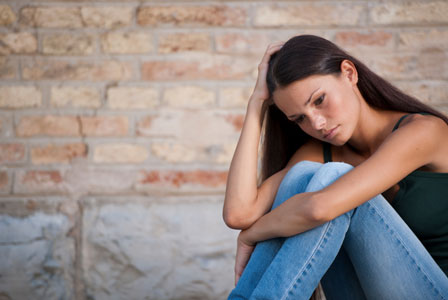
Teen girls are three times more likely to suffer major depressive episodes than younger tween girls, according to new research.
increase in major depressive episodes
With the surge of hormones in puberty and all of the other difficulties facing teen girls, depression is something she shouldn’t have to face. What are the signs that your teen daughter may be depressed, and what can you do to help?
New research by the Substance Abuse and Mental Health Services Administration suggests that as girls move from their adolescent years into their teens, they are three times more likely to suffer from a major depressive episode. According to the research, just 5 percent of 12-year-old girls had experienced a major depressive episode within the past year, compared to a staggering 15 percent of 15-year-old girls. Girls were also found to be three times more likely to experience major depressive episodes than boys of the same age.
The Diagnostic and Statistical Manual of Mental Disorders developed by the American Psychiatric Association defines a major depressive episode as when a person experiences a period of depressed mood or loss of interest or pleasure for two weeks or longer. This period is also accompanied by at least four other symptoms that reflect a change in functioning, such as problems with sleep, eating, energy, concentration and self-image.
Why the increase?
How to help
It is important for young girls to develop coping skills in order to help them deal with potential depressive episodes in their teens and further down the road. Learning how to face adversity and work through it builds resilience that can carry a young girl through the ups and downs of life.
Since the rise in depressive episodes occurs during puberty, it would be easy to blame surging hormones for the increase. Depression in adolescent girls may be mistaken for mood swings common in puberty, and not recognized as true depression until much later in her teenage years. By this time parents or other adults may recognize signs of depression and may refer the teen for treatment options.
It is unclear why girls seem to suffer from depression more often than boys. "It's likely a number of different factors, including psychological, biological and social factors that may all contribute to some degree," says Richard McKeon, Ph.D. and chief of the Suicide Prevention Branch at SAMHSA. "It is a time of great transition, a time of biological transition, a time of social change, so there are likely a number of different reasons."
Did you know acne actually causes depression? >>
Moods, or more?
Because the teen years are characterized by change, moodiness and occasional angst, it may be hard for parents and other adults who work with teens to accurately see the difference between moodiness and depression. "If a mood persists and there are other associated signs like difficulty concentrating, difficulty functioning, loss of appetite or energy, that teenager may require additional help," says McKeon. Many times early intervention with counseling can help prevent more major depressive episodes down the road that may require medication.
Is it depression or normal mood swings? >>
![]() Bottom line
Bottom line
If you sense that a young girl in your work environment, family or social circle could benefit from mental health counseling, don’t be afraid to discuss it. Your observations could be the one thing that makes a difference in her life.
More on parenting teens
Understanding your teen's nutritional needs
Does your teen have an eating disorder?
Teen girls and breakups: Helping them move on